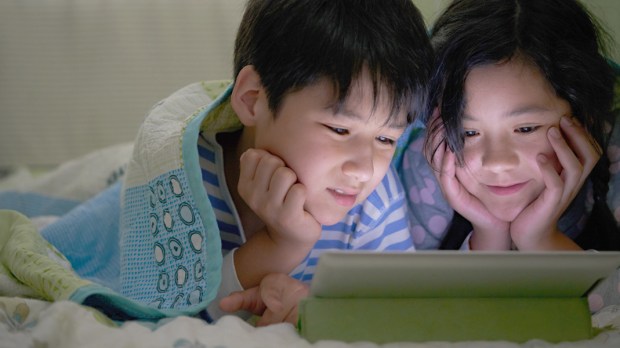It’s Thursday night. Matthew, our 9-year-old, is working feverishly to put the finishing touches on a crossword puzzle that he’s been working on for some time. His younger brother, Noah, inspired by his brother’s wordy pursuits, has tried composing his own original mini crossword (with clues that leave me a little stumped). Their older siblings are hanging in the living room with Anne of Green Gables and Where the Red Fern Grows (the books, not the movies), while the youngest ones are coloring with gusto. The TV hasn’t been on since Monday. The house, for the moment, is largely quiet.
But I know the landscape in our house is starkly different from that of the average family. Studies indicate that in the U.S. today, children ages 8 to 10 spend an average of 5.5 hours a day engaged with a media device. Considering typical multi-tasking rates, the average exposure rises to 8 hours. By age three, 25 percent of children go online daily. Two- to five-year-olds average 3.5 hours of television per day. A 2010 survey found that almost a 1/3 of kids ages 8 to 10 have a mobile device. Approximately 7 in 10 kids between ages 8 to 18 have a TV in their room.

Read more:
Keeping kids clean is overrated – Here’s why you should let them eat dirt
Our home, on the other hand, is decidedly low-tech. There are seven kids ranging in age from almost 11 to newborn, but only one TV in the living room. My wife, Amy, has a basic cell phone (with no texting or internet capacity); we still have a landline and an answering machine. There is one laptop in the home and no other devices. Our kids probably average about 2 to 4 hours a week of television, mostly sports and movies; we don’t have cable. Commercials are turned off most of the time.
All of these are part of a conscious decision my wife and I made. As a child psychologist, I am acutely aware of the myriad of risks (and limited benefits) that are associated with kids’ use of mobile devices, and high screen exposure. As a teacher, my wife knows that the educational benefits of screen time we’re so often told about lack the consistent research to support their claims. Many high-tech executives site the same reasons for enrolling their own kids in low-tech education. And as parents, we all know how important it is for our kids to learn critical thinking skills, not just gadgets.
Read more:
Is Online Gaming Turning Our Children’s Minds into Mush?
But, even if you agree with me about all that, the choices my family has made probably seem “old school” to you — as they do to many of our parenting peers. And, I’ll admit, unplugging in today’s world the way we do carries its own challenges. From an early age, our kids have pointed out that many of their friends and classmates are plugged in much more than they are. I’ve had to face questions, and even pleas, about when they, too, will be able to have a phone, a tablet, a laptop and more. More often than not, my answers are met with disappointed looks and grumbling comments about “so and so having one.”
In the midst of all this, though, Amy and I see valuable opportunities for our kids. From an early age, we have been teaching them about media and advertising — the tricks of the trade, false promises made by media moguls, subtle priming strategies, and many ways that mobile devices are not quite the spectacular life-changers they promise to be. And I see them learning, with a growing acceptance of their parents’ low-tech policies. I think they notice the downside of devices, when they cause drama and heartache at school for others. Yes, my kids are young. But they seem to be less naive and more aware about the technological world around them than your average tween. We still want them to enjoy sharing moments on the internet together or using it as a tool for further exploration. But we hope that they are learning its proper place in our world.
Read more:
In Defense of Screen Time
The topic of mixing kids and technology is one that crops up in my office a lot. Over the years, I have spoken to thousands of people (professionals and parents) … and none has ever chided me for exchanging convenience and instant gratification for health and well-being. Sure, some have told me they just don’t think the effects of tech are as bad as we all think, or that the jury is still out. Others tell me that the purported benefits make it difficult to limit tech in their homes; they want to give their kids every advantage in the modern world. But most simply admit that it’s really hard to say “no” to their kids when everyone else is doing it, and the grandparents want nothing more than to give them device upon device for Christmas.
After immersing myself in this topic for 10 years, I have little doubt where best practice lies. Because I’ve experienced it first hand, not just by parenting my kids, but by being one. See, to tell the whole story, you must go back a generation. I was the kid without a VCR, or gaming systems, or a television that got most channels. I didn’t have my own car until I finished sophomore year in college. I was convinced I would get what I wanted in “my time”; that part eventually faded away in high school, and life moved on. And I am so so glad it did because as the years turned into decades, I realized that one of the greatest gifts my parents gave to me was an acute understanding of what I needed, and what I didn’t.

Read more:
5 Ways to divorce your smartphone in Lent… or even after!
In the end, I think this is what Amy and I are trying to cultivate in our kids. We are not anti-technology. We are just pro-conscientiousness — the kind that comes with knowing that everything has its time and place, unless it isn’t really necessary or good at all.
As one of the 2 percent of individuals in my age bracket without a mobile device, I often have conversations with people who are shocked at my bold choice. I’m sure some of them think I am nuts, some don’t know what to think, and some seem outright jealous. Like any conscious choice, my low tech life has it pros and cons. I would say that about 2 percent of the time, I wish I had a mobile device for the convenience and experience it offers. Yet for the other 98 percent of the day, I feel so blessed to be gadget-free. And blessed to have a wife who wouldn’t have it any other way.

